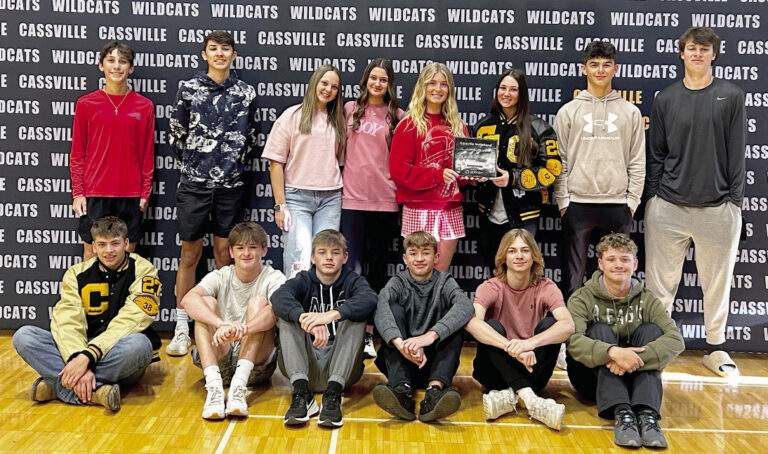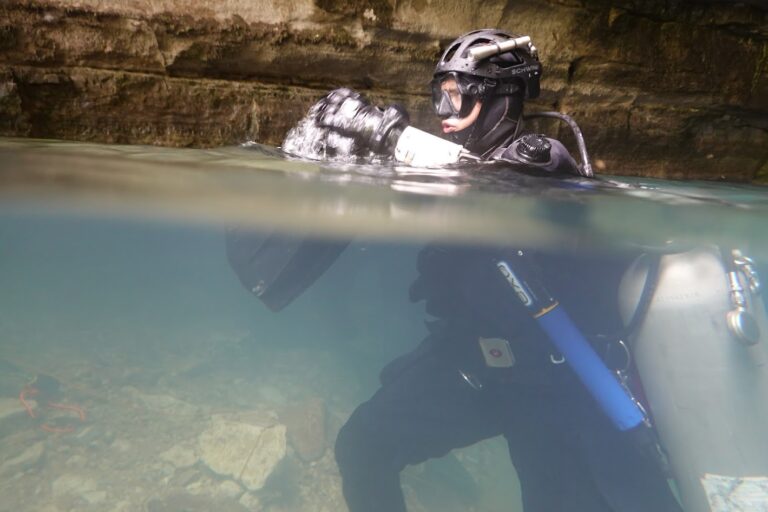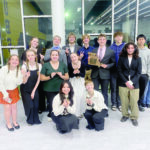CASSVILLE PROGRESS: Retirements mark year in community news
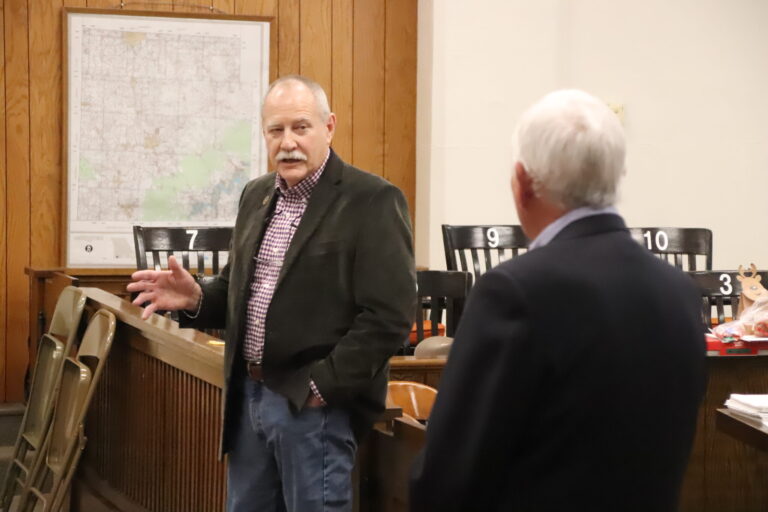
E9-1-1 awarded for excellence; Goodman named chief judge
It could be called the year of retirements. Two county leaders and one community leader hung up their hats last year.
Beyond that, the Barry County E9-1-1 Center was awarded for its excellence and a local organization continued working with Dress a Girl Around the World.

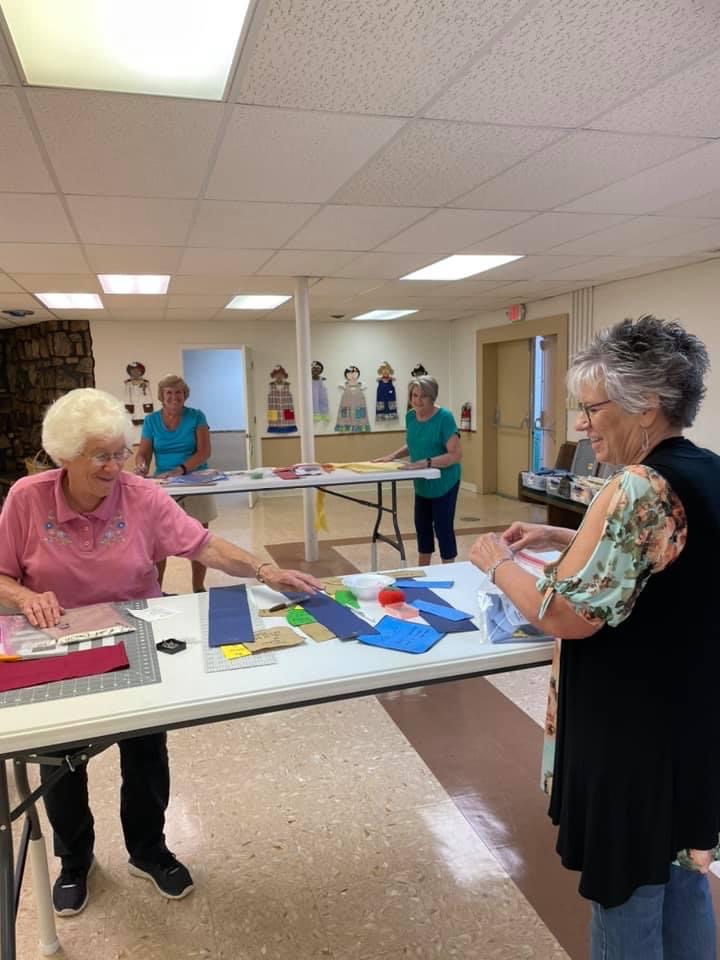
Hazel Gripka and Rhonda Harris, a mother daughter duo, make dress kits during one of the work days for Dress A Girl Southwest Missouri, hosted at the Emmanuel Baptist Church in Cassville. Contributed photo
28 years as public employee
A stalwart of Barry County politics made his final exit from the courthouse, as Barry County Presiding Commissioner Gary Youngblood retired.
On Dec. 19, about 50 people came to wish Youngblood well at a retirement party at the Barry County Courthouse, celebrating his 24 years as a county clerk and the last 4 as presiding commissioner.
Youngblood worked as a plant manager for MFA and maintenance director for Cassville schools before county politics came calling. Circuit Clerk Dick Sanders was running for the State House in 1992, and he had asked Youngblood if a circuit clerk appointment piqued his interest.
“I didn’t know Dick very well, and only because I made payments to the circuit clerk’s office every month,” Youngblood said. “He took a liking to me, I guess; I’m not sure why. I told him I wasn’t sure and I needed some time to think about it. After three or four weeks, I said I would, but he did not win the election so that never came to fruition.”
Two years later, Youngblood knew the county clerk spot was coming open, and the incumbent did not intend to refile.
“Glen Dale and Misha Hull were the assessor and collector, and I visited with them and thought I would go for it,” he said. “I didn’t know much about what all it entailed, but people knew me well enough to elect me.”
A two-election victory, Youngblood beat a familiar face in the Republican primary, current Barry County Commissioner Gene Robbins, then defeated Democrat and then-treasurer Ben Loudermilk in the general.
For 24 years, Youngblood ran the county clerk’s office, challenged twice by Democrats but winning both. Over that time, plenty of changes occurred, one of the largest being the switch from punch-card to optical machine voting.
“We did that in the early 2000s,” he said. “Another big memory from the clerk’s office was in 2000, when myself and five other southwest Missouri clerks went to Florida to be observers in the recount for the Bush-Gore election. That was in December of that year and a big memory. That was a big part of history.”
From the clerk’s office, which works with each other county office in one capacity or another, Youngblood also saw the county moving forward.
“I was in office when the judicial center was built in 2002, and not to my credit, but that was a big deal,” he said. “Moving all the lawyers and criminals out of the courthouse to their own building was a big step. On law day, it would be jam-packed with people standing and hanging over the railings because associate court was upstairs and circuit court was downstairs. It was nice when they moved and we had a little more room to breathe in the courthouse.”
Four years ago, Youngblood transitioned to Presiding Commissioner, a job he had worked in concert with for the past two decades.
“I knew the commissioner job and knew it would be stressful, but it’s not quite the specific attention to detail like in the clerk’s office,” he said. “The clerk’s office is like the superintendent’s office of a school. It deals with every other office from HR to tax levies, elections and the county budget. There are a lot of buttons to push.”
As commissioner, Youngblood’s buttons shrunk in number and grew in size, as he and the commission pressed buttons leading to a law enforcement sales tax passing and a new jail and health department project commencing. He also helped lead the county through the COVID-19 pandemic, a challenge no recent commission had faced.
“My main goal as commissioner was just to make sure the officeholders knew money was not always easy to come by and to not waste it,” he said. “[The sales tax and jail-health department] are important for the future of the county, but I don’t want to take credit for it. I think the jail and health department will be one of those things that, 50-60 years down the road, it will be appreciated. I’m not a fan of all the government spending right now, but I’m glad we used our money for something that will be there and that people will continue to see for many years. The tax, I hope, will be an asset to the voters, and again, I don’t want any credit. I was just part of the team.”
Youngblood is one of a nearly 30-year generation of county leaders, retiring after colleagues like former Presiding Commissioner Cherry Warren, former Collector Janice Varner and former Treasurer Lois Lowe. At his retirement party, the next group now in office thanked Youngblood for his work in county politics and leadership in each of his roles.
“It’s a sign of the times,” Youngblood said. “We were all there for several years together, and that’s just the way it works. I hope the people have appreciated the effort I have put in, and I’m grateful to them for giving me the opportunity.
“In all honesty, to me, it has always been an employment. I’d always been employed all my life, and even though I worked for the public, I worked to pay my bills. I did not do the job in a politicky way because neither job works that way.”
Youngblood was humble when asked what he hoped he and his colleagues would be remembered for after nearly 30 years.
“I don’t need to be remembered for anything,” he said. “[As opposed to a public servant], I saw myself as a public employee, figuring I was employed by the public. I didn’t like the term servant. I did it because the job needed to be done.”
Lowe retires from treasurer post
After 27 years as the Barry County treasurer, Lois Lowe is hoping to enjoy some light travel and family visits after her retirement.
Lowe’s last day at the office was Feb. 28, 2022, and she said she will miss many.
“I’ve been here for 27 years, but now I’m having a few health issues,” she said. “It’s hard to say what I will miss the most, but there are a lot of people I worked with that I will miss. I enjoyed working with people, like at the road districts, and I will miss a lot of people at our annual state training sessions for treasurers.”
Lowe said over her quarter-century in county government, a lot has changed.
“It seems like the workload just gets to be more and more than it ever was,” she said. “All the reports and hoops we have to jump through now take time. [Current Presiding Commissioner] Gary Youngblood and I were elected to county office in 1994, and I know he will agree it’s just more and more work every year.”
Lowe said in her retirement, she hopes to do some travel, but not too far.
“My husband and I want to go on some little trips, just like in a day, while we are still able,” she said. “We also have some relatives we’d like to go see.”
Replacing Lowe as interim treasurer was be Gretta Tripp, officially elected to the position in November.
“She is motivated, sharp, conservative and is catching on to it all very quickly,” Lowe said.
28-year community anchor retires
For nearly three decades, Gail Reed has been an anchor that holds the community together buy supporting those most in need.
Reed has spent 28 years working as the supervisor at the Barry County Neighborhood Center, and she hung her hat on the door on Dec. 2.
“I started on March 7, 1994,” she said. “I started as the family resource specialist, and I did that for a year. When my supervisor retired, I applied for this position and I got it, I’ve been doing this ever since.”
Reed said she is most excited to turn off her alarm clock.
“Right now, I don’t have plans for my retirement,” she said. “I told everyone I would be home before the snow falls this year.
“I enjoy reading, jigsaw puzzles and watching movies, especially Hallmark Christmas movies. I am excited to spend more time with family.”
Reed has one son, three grandchildren and three great-grandchildren who she will spend more time with.
“You miss so much when you aren’t with them all the time,” she said. “They all live pretty locals they are close enough to get to see them a lot.”
Reed said she first discovered OACAC about 9 months before she started working there.
“I was running a summer youth program for 14-21 year olds,” she said. “Over the years, I have seen so many things come through this place. I wouldn’t say I have created many programs personally, but I like to think that I helped make some of those programs successful.”
Reed was on the first committee that developed the Tri-County Health Care Consortium, which has since become Access Family Care.
“I have always been impressed with what Access has become over the years,” she said. “As a group, we saw what was needed and they did it.
“We also started the School Fair which has also grown from what it started out as. The first year, I went to local businesses and raised about $200. I bought as much as I could and handed it out to parents. Now, we serve about 200 children every year, and they get everything they need and more.”
Another program Reed has seen over the years is the Senior Resource Fair.
“We did that for a few years, and I loved it,” she said. “There was so much information for our senior community. It was a great project.
“We also do a Reall (Reality, Enrichment, Life Lessons) life simulator.”
Reall is for children in grades 7-12.
“It is interesting, and the kids get a lot out of it,” Reed said. “There are two 20-minute sessions. In the first session, the children are given identities of people who didn’t graduate. They have jobs and a certain amount of money and they have to live. The second session, the identities are given a degree with better jobs and more money, and they see the difference in options.
“It really opens them up to talk about things and to me it is a great program for the kids.”
Another program is VOICE.
“It is a vocational program for grades kindergarten to sixth grade,” she said. “We bring in different people with different careers just to get them thinking about what they would like to do when they grow up. I love that it started them thinking about career paths so young. We have dentists, eye doctors, DNR and more.”
Reed said it is hard for her to pinpoint a favorite program.
“Whatever is happening at the time is my favorite,” she said. “My whole heart is in it. The things that we do regularly are the things that make a big difference.”
Reed said the programs like the clothing room, diaper drives, having hygiene items and coat drives.
“These are things that we give to families that help them,” she said. “I love that part of it.”
Reed said they also participate in Share Your Christmas.
“Unfortunately, we also see natural disasters like flooding,” she said. “The way the community comes together to help those who have suffered is amazing. With major flooding we became the point that people would come to and help get resources to those who need them.
“Whether it is Christmas, school supplies or a natural disaster, it always amazes me how the community responds.”
Reed said it is the little things that make a difference in people’s lives.
“That is what makes what I have done all these years worthwhile,” she said. “I think for the person who follows me, they need to integrate into the community. Get involved and remember where we all came from. Always be kind, and treat everyone the same. You will have to be a champion for the low-income population and do everything you can to help someone.”
Reed said to always find things that bring out smiles.
“Since people have found out I am retiring, they have come to me to thank me and talk to me,” she said. “I will miss that. I enjoy talking to people.”
Reed said people have told her how she has made a difference.
“Some were things I didn’t even realize was such an important thing to do,” she said. “One person thanked me for helping her with filling out paperwork. I do that a lot, so I didn’t think much of it, but this person said they have a learning disability and couldn’t have done it themselves. I didn’t know they had a disability — all these years, I didn’t realize the difference I made.”
Reed said she knew it would be difficult to leave, but she also knew it was time to leave.
Barry County E9-1-1 awarded for
excellence
Barry County Emergency Services E9-1-1 was been recognized by The International Academies of Emergency Dispatch (IAED) as an Accredited Center of Excellence (ACE) for Emergency Police Dispatching (EPD).
IAED is the standard-setting organization for emergency dispatch services worldwide. Accreditation (and subsequent re-accreditation) from the IAED is the highest distinction given to emergency communication centers, certifying that the center is performing at or above the established standards for the industry. Centers who earn ACE status are the embodiment of dispatch done right, and have demonstrated strong local oversight, rigorous quality processes, and a commitment to data-driven continuous improvement.
This new accreditation for Barry County Emergency Services E9-1-1 makes it the 27th dispatch center in the world to earn one, and only the second dispatch center in the World that is dual accredited in Emergency Medical Dispatching and Emergency Police Dispatching. The center also uses all three Priority Dispatch SystemTM outline (Medical, Fire and Police)
“I am very proud to make this announcement,” said Mike Phillips, ENP, Barry County Emergency Services E9-1-1 executive director. “This agency has been working on this for a while, and we are excited that we have met these standards and performance points. This shows our citizens and agencies we work with they have some of the best emergency dispatchers available working in our county. This group has demonstrated a willingness ‘to be better’ and this accreditation reflects the work and dedication it takes from staff to accomplish this agency goal.”
Accreditation is valid for a three-year period, during which all standards must be upheld. Emergency communication centers can earn multiple accreditations, one for each emergency discipline they service (medical, fire, police, and emergency nurse triage).
More than 3,500 emergency communication centers worldwide use the medical, fire, police, and emergency nurse triage protocols developed and maintained by the IAED. The protocol-based system — known as the Priority Dispatch SystemTM — is recognized as the standard of care and practice for emergency dispatch, and is used in 46 countries.
Dressing girls around the world
Dress a Girl Around the World is a campaign under Hope 4 Women International, a non-denominational independent Christian organization and has been making dresses since 2006.
On a local level, Sue Cavness, director of the Dress A Girl Southwest Missouri chapter, brought attention to the organization in Cassville in May 2018.
The dresses are made from donated men’s button up dress shirts and give girls around the world dignity and the joy of having at least one new dress.
Cavness went to her pastor at Emmanuel Baptist Church in Cassville to originally ask to use the church’s Facebook page to get the word out.
Since then, the organization has its own Facebook page, but the Emmanuel Baptist Church continues to host work days for the group to make dress-making kits, take in donations and much more.
“We distribute these dresses wherever there is a need,” she said. “This is Dress A Girl Around the World really. Sometimes we can forget that need can be in our backyard and our own community.”
Dress a Girl Southwest Missouri, or DAGSWMO, is an ambassador for Dress a Girl Around the World.
Cavness said there are hundreds if not thousands of ambassadors around the world.
“We just finished our third year,” she said. “We have come such a long way on this amazing little journey.”
Cavness said about six months ago, she reached out to Sara Forhetz with Convoy of Hope to be in the loop of any upcoming trips that could be a distribution for the dresses, and now shorts.
When DAGSWMO first started, Cavness was trying to build, so she focused on the dresses, but in 2019 the organization began making and distributing shorts for boys also.
“Once we got the dresses rolling out, we were able to start focusing on making shorts,” she said. “They aren’t made of the men’s button-up shirts like the dresses, so we had to build up a stash of other fabrics.
“We sent out the first batch of shorts to Bolivia in September 2019.”
Cavness said she wants people to know that while these dresses and shorts are often taken on mission style trips, they are for anyone with a need.
“We have actually donated to local schools,” she said. “We are here to help children who need help. People are welcome to contact us to let us know where those needs are.”
On each dress and each pair of shorts, there is a small patch that is sewn into the material.
“I think the patch is the most important part,” she said. “Not only does the dress itself help deter predators, but with the patch, it shows that those children are backed by an organization. Every girl deserves a dress that makes them feel loved and worthy, and this makes them feel protected. A dress with a patch may change their destiny for the better. We hope a predator will move past them and hopefully completely away from the area.”
Cavness said the organization is always happy to help state side, but often they get distributed over seas.
“There are a few different ways people can help DAGSWMO locally,” she said. “First, if you sew, you can make the dresses and shorts. We will provide the kit to get you going. Second, you can donate. We run on donations and need men’s button up shirts, other fabric for the shorts, new undergarments are needed, and we put a beanie baby in each dress and a matchbox car in each pair of shorts. We are also looking for luggage that zips. They tend to use those overseas for a dresser-type thing. So we can load it up and they can just keep the luggage.”
Finally, people can help in Cassville by attending work days at the Emmanuel Baptist Church.
“We run those April through October, usually on Tuesdays,” she said. “Sometime every week, sometimes bi-weekly. It depends on the need and the supplies we have.”
Works days usually see 12-20 volunteers.
“I am always waiting on God’s direction to manage DAGSWMO,” Cavness said. “I have been getting a lot of attention from the Springfield area, but I can’t drive there every day. God has taken care of so much and continued to provide for DAGSWMO.”
Additionally, Cavness said the organization is always open for prayers.
“We always appreciate a prayer,” she said. “God has provided every time there is a bump in the road.”
Cavness said a total of 1,503 dresses and 491 shorts have been sent out since 2019.
In 2021, 566 dresses and 217 shorts were sent to places including, El Salvador, Kenya, Mexico, Uganda, Bolivia and more. Already in 2022, 60 dresses and 15 shorts were sent to Tanzania.
For more information, the best way to reach Cavness is through the Facebook page, https://www.facebook.com/joesuecav, but people may also call the Emmanuel Baptist Church at 417-847-3239.

